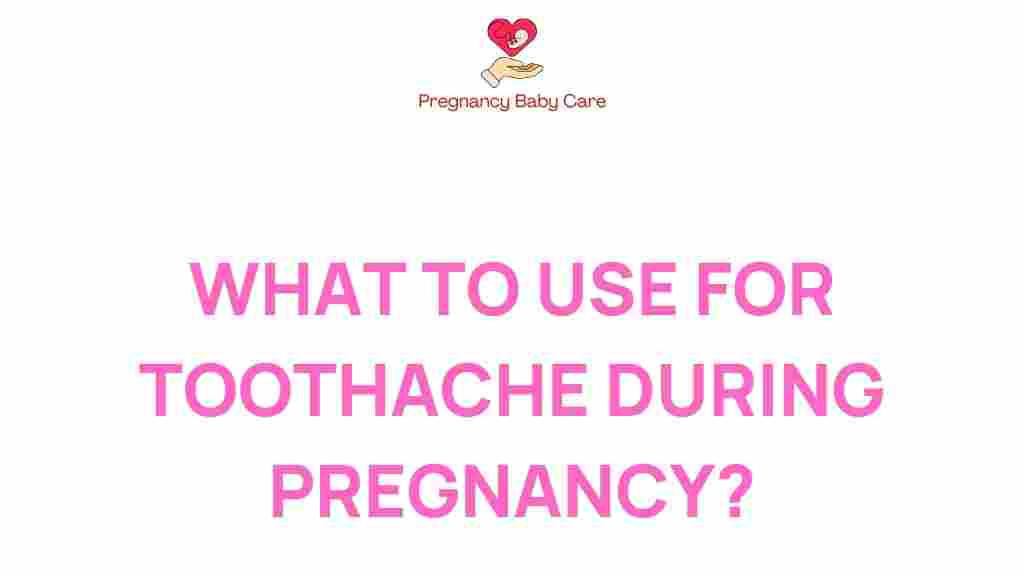Pregnancy brings a whirlwind of changes to a woman’s body, and while many of these changes are joyous, some can lead to discomfort, such as toothaches. Understanding how to manage toothache relief during pregnancy is crucial for expectant mothers to maintain their oral health. This article provides insights into safe remedies, effective pain management strategies, and the importance of dental care during this special time.
Understanding Toothache Causes in Pregnancy
Toothaches during pregnancy can stem from various causes:
- Hormonal changes: Increased levels of hormones can affect the gums and teeth, leading to sensitivity and inflammation.
- Dietary changes: Pregnant women often crave sugary foods, which can contribute to tooth decay.
- Oral health neglect: Morning sickness and fatigue can lead to reduced dental hygiene practices.
Importance of Dental Care During Pregnancy
Maintaining good oral hygiene is vital for expectant mothers. Poor dental health can lead to complications, not only for the mother but also for the baby. Studies show that untreated dental issues can increase the risk of preterm labor and low birth weight. Therefore, regular dental visits should be part of your pregnancy care routine.
Safe Toothache Relief Methods for Expectant Mothers
When faced with a toothache, pregnant women must be cautious about the remedies they choose. Below are some safe toothache relief options that can provide comfort without harming the baby.
Natural Treatments for Toothache Relief
Natural treatments can be effective and safe for managing toothache relief during pregnancy. Here are some options:
- Saltwater rinse: Mix a teaspoon of salt in a glass of warm water and rinse your mouth to reduce inflammation and kill bacteria.
- Cold compress: Apply a cold compress to the outside of your cheek for 15-20 minutes to numb the pain and reduce swelling.
- Clove oil: Known for its analgesic properties, clove oil can be applied sparingly to the affected area with a cotton ball.
- Ginger tea: Ginger has anti-inflammatory properties. Drinking ginger tea can help alleviate discomfort.
Over-the-Counter Options
While many medications are off-limits during pregnancy, some over-the-counter options can be considered:
- Acetaminophen: Generally considered safe during pregnancy for mild to moderate pain.
- Topical anesthetics: Gels or ointments containing benzocaine can provide temporary relief.
Always consult with your healthcare provider before taking any medication during pregnancy.
Key Pain Management Strategies
Managing pain effectively is essential during pregnancy. Here are some strategies expectant mothers can use:
- Stay hydrated: Drink plenty of water to help wash away food particles and bacteria.
- Practice relaxation techniques: Techniques such as deep breathing, meditation, and prenatal yoga can help manage overall pain and stress levels.
- Rest: Ensure you get enough sleep, as fatigue can exacerbate pain perception.
When to Seek Dental Visits
Regular dental visits are crucial, but certain situations require immediate attention. Expectant mothers should consult a dentist if:
- The toothache persists for more than a day.
- There is swelling in the gums or face.
- You notice any pus or discharge from the gums.
- You experience fever or other systemic symptoms.
Be sure to inform your dentist that you are pregnant so they can tailor their approach to your needs.
Dental Care Tips for Pregnant Women
Keeping your mouth healthy during pregnancy is vital. Here are some dental care tips:
- Brush twice daily: Use fluoride toothpaste and a soft-bristled toothbrush.
- Floss daily: Flossing helps remove plaque between teeth and prevents gum disease.
- Limit sugary snacks: Opt for healthier snacks like fruits and vegetables.
- Stay on top of dental appointments: Schedule dental check-ups to catch any issues early.
Common Dental Problems During Pregnancy
Expectant mothers may experience specific dental problems, including:
- Pregnancy gingivitis: Hormonal changes can cause gum inflammation.
- Enamel erosion: Frequent vomiting due to morning sickness can erode tooth enamel.
- Tooth decay: Increased sugar intake can elevate the risk of cavities.
Troubleshooting Toothache Relief
If you find that over-the-counter methods and natural treatments are not providing relief, consider these troubleshooting tips:
- Evaluate your dental hygiene routine: Ensure you are brushing and flossing effectively.
- Monitor your diet: Keep track of your sugar intake and make healthier choices.
- Check for underlying issues: A persistent toothache might indicate an infection or cavity that needs professional treatment.
Conclusion
Toothache relief during pregnancy is essential for both the comfort of the expectant mother and the health of the baby. By adopting safe remedies, maintaining good oral health, and scheduling regular dental visits, pregnant women can effectively manage dental discomfort. Remember, your health and your baby’s health are paramount, so don’t hesitate to seek professional help when needed. For more information on dental care during pregnancy, visit Mouth Healthy for expert advice.
With these tips and knowledge, navigating toothache relief and maintaining oral health during pregnancy can be a manageable task.
This article is in the category Health and created by PregnancyBabyCare Team
